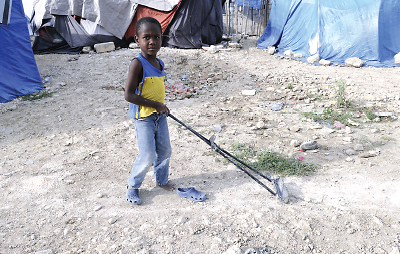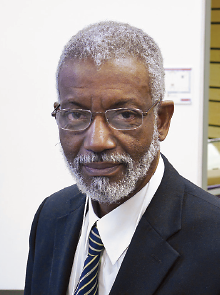Diaspora Haitians Help Their Home Country Improve MH Care
Abstract
Help to improve Haiti’s mental health services may need to come from outside the nation but must be coordinated with those on the scene, say people involved in the effort.
In some ways, the state of mental health care in Haiti is better than it was before the devastating earthquake that struck the Caribbean nation in 2010.

“The good news is that Haiti is rebuilding capacity and training general practitioners and teachers to recognize mental illness,” said Haitian-American psychiatrist Richard Douyon, M.D., director of hospital operations at the Miami VA Healthcare System and an associate professor of clinical psychiatry at the University of Miami School of Medicine (Psychiatric News, March 5, 2010).
Douyon was part of a multinational group from Haiti, the United States, Canada, and France who met in Montreal in June to discuss ways to help Haitians. The conference was organized by Rebâti Santȳ Mentale, in collaboration with APA’s Division of Diversity and Health Equity and the Department of Psychiatry at the University of Montreal. Rebâti is a nonprofit organization that supports increasing mental health capacity in Haiti.
Haiti has passed legislation mandating that mental health care would become part of the primary care system, and at least 10,000 care managers have been trained to assist in both mental and general medical care.
However, other aspects have not gone so well, said Douyon, a co-founder and now treasurer of Rebâti, in an interview with Psychiatric News. The two main psychiatric hospitals, which provided long-term care, have not been rebuilt. Also, the choice of psychiatric medications is still quite limited. Today, there are only 1,949 primary care physicians, 24 doctoral-level psychologists, and nine psychiatrists in Haiti, he said.
Teachers Learn to Recognize MH Needs
The need for advisors now is to work closely with local Haitians to upgrade mental health services and access, said Guerda Nicolas, Ph.D., an associate professor and chair of the Department of Educational and Psychological Studies at the University of Miami.
She described one project that combined local input with outside assistance. Working with the Haitian Ministries of Health and Education, Rebâti was invited to the town of Arcahaie. Nicolas and other team members met with the head of the local hospital and heads of area schools to learn what mental health issues concerned them and what they wanted to do about them.
The result was a program to train teachers to recognize mental health needs in the children in their classrooms.
“This was not a Rebâti project, but an Arcahaie project,” said Nicolas. “They saw it as something they were implementing.”
The curriculum was not imported but was developed jointly, and it focused on mental health as it pertains specifically to Haitian people. Even the language used in referring to psychiatric disorders was altered to dovetail with Haitian Creole expression of symptoms.
Diaspora Haitians conducted the first five-day training session. To develop capacity in Arcahaie, those trainers selected two of their most-promising students to first assist in the next round of teaching and then begin training on their own. Eventually, the initial Rebâti group functioned as consultants to the local trainers in Arcahaie.
The next step is construction of a children and families’ wellness center that Nicolas hopes will serve as a model of how to address the mental health of Haitian children and their families in ways that are culturally relevant to area residents.
Psychiatric Training Plans Described
Also at the conference, two Haitian-American psychiatrists presented draft proposals for augmenting the formal psychiatry training in Haiti.
One plan called for two years of didactic training in medical school followed by two years of mixed didactic and clinical work, all delivered by visiting foreign instructors, said Jean Tropnas, M.D., a clinical professor of psychiatry at Downstate Medical Center in Brooklyn, N.Y. A plan for residents, based on U.S. postgraduate training programs, was suggested by Louis Belzie, M.D., M.P.H., director of the palliative care program at Brookdale University Hospital and Medical Center in Brooklyn.
Postgraduate training is a particular problem in Haiti, said Sarah Denaud, M.D., a PGY-2 resident at the Universitȳ Notre Dame d’Haiti’s medical school.
“There is little mentoring in Haiti and too few psychiatry residency slots, but training abroad is difficult and expensive,” said Denaud in an interview.
Both Tropnas and Belzie noted that their ideas were intended to spur further discussion and that many questions remained. How would Haiti’s three medical schools participate? How would the visiting faculty integrate their work with that of Haitian colleagues? What language would be used for instruction—English, French, or Creole?

Rebuilding Haiti’s mental health system after the 2010 earthquake will require close cooperation between entities inside and outside the country, said Renȳ Domersant, D.E.S., M.Sc., of Haiti’s Ministry of Public Health and Population.
Such proposals were good starting points but required a closer look in light of the need to bring mental health care into primary care settings, commented Renȳ Domersant, D.E.S., M.Sc., national coordinator for mental health at the Haitian Ministry of Public Health and Population.
Ideally, all medical students should learn early on about integrating mental health care into primary care as part of multidisciplinary teams, although this has not yet happened, he said. A national policy for health and mental health is due in October.
“Perhaps 80 to 90 percent of mental health problems don’t need mental health specialists and can be managed in primary care,” Domersant told Psychiatric News. “We need psychiatrists at the top of the pyramid, but we want to approach mental health care with community services and multidisciplinary teams.”
In many ways, Canadian clinicians (who are already active in Haiti) have much to offer in that cause, said Domersant. “They use textbooks written in French, and their health care system is already based on integrating mental health into primary care.” ■



